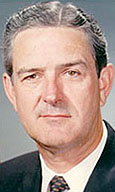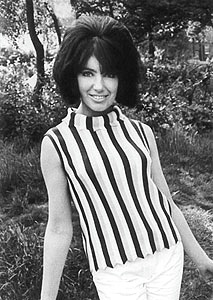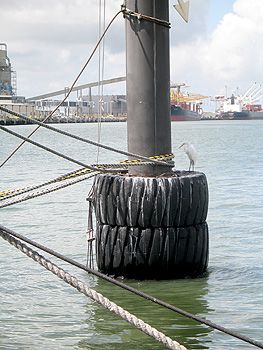The Amazing Radio London Adventure |
The Last Hurrah in the Lone Star State
Back in Texas, I found that broadcasting was not the same as I had left it almost four years earlier, when FM radio was just coming into its own. For a number of years most of the AM operations had owned FM stations, but because FM was only on a selected number of radio dials, these stations were operated mainly as a public service. As manufacturers began putting FM frequencies on all the new radios, FM became the 'flavor of the day'. It was much clearer than AM, minus all the static. It didn't have the range of AM, but it was ideal for local broadcasting.
One basic problem caused by the FM insurgence, was that it doubled the number of stations vying for the advertising market. This sent many of them into a cost-cutting frenzy. They could survive only by automating the output and cutting out most of the deejays, or hiring high school graduates at minimum wage, letting them segue records in between advertising spots.
In a market the size of Dallas/Ft. Worth, there had been about 20 AM stations. Now there were about 40 AM and FM stations and only three or four of these were making the big bucks, while the rest were just getting by. Broadcasting in America was in a total mess.
I took a job with KNAL in Victoria, Texas. They were buried so deep in the boondocks that they hadn't heard what FM was doing to the major markets, so they were still paying a liveable salary. This is where my family stayed for about two-and-a-half years, while I figured out what our next big move would be.
It finally came. Interstate Broadcasting Company (IBC), a regional news network, was being formed in Dallas. This network was set up to serve the states of Texas, Louisiana, and Mississippi. I initially made a deal with IBC to be their Louisiana and Mississippi representative. My job was to contact various radio stations in those states, to persuade them to carry our news broadcasts. Signing them up was not very difficult and by the time we went on the air, we had about 83 or 84 affiliates.
After a few months, IBC sent me to Austin, the Texas State capital, to be the bureau chief. It was here that I met frequently with many of the state legislators and government officials. Almost every morning I had coffee with Gus Mutscher, the Speaker of the House, and sometimes Ben Barnes, the Lieutenant Governor, would join us. Gus Mutscher was a very personable gentleman who had just about everything going his way. He was well off financially and had been fortunate enough to marry a Miss America. However, at the time I knew him, he was involved in the Sharpstown Bank scandal which was to erupt after I left Austin. This landed Gus and other legislators in prison for five years. The scandal hinged on the Sharpstown Bank of Houston bribing legislators to vote for legislation that served the interest of the bank. Ben Barnes had been hand-picked by the Democratic Party to be the next governor of Texas, so his campaign was launched with a $100-a-plate dinner for him at a local convention center. Being with the press, Ronagh and I were invited to the dinner at no charge.
(Right – L to R) Gus Mutscher, Preston Smith, Lyndon Johnson and Ben Barnes during 'Ben Barnes Day' in Brenham, Texas, August 1970. Image courtesy of the Texas State Library and Archives Commission
Almost the first person we ran into was my old acquaintance ex-Governor John Connally. It had been about 6 or 7 years since we had met, so I reintroduced myself to him and asked if he remembered me. Being the consummate politician that he was, he said, "Of course I do, Ben, how are you?" I then introduced him to Ronagh and after exchanging a few words, we left him to the crowd hovering around him. As the dinner was kicked off, alongside Ben Barnes the party favourite, several ex-governors of Texas were on the stage, including Allan Shivers, Price Daniel and John Connally. The then current governor Preston Smith was also on stage with former President Lyndon Johnson. As each of these distinguished gentleman stood to be introduced, they received a firm round of  applause, but when John Connally (left) and his wife Nellie stepped forward, the audience of around 1000 sprung to their feet and gave them a rapturous ovation. There was little doubt that Connally was the most beloved governor of Texas since the famous Sam Houston. (As mentioned in Chapter 1, John Connally had been travelling in the same car as President John F Kennedy on the day that he was assassinated and he also suffered gunshot wounds.)
applause, but when John Connally (left) and his wife Nellie stepped forward, the audience of around 1000 sprung to their feet and gave them a rapturous ovation. There was little doubt that Connally was the most beloved governor of Texas since the famous Sam Houston. (As mentioned in Chapter 1, John Connally had been travelling in the same car as President John F Kennedy on the day that he was assassinated and he also suffered gunshot wounds.)
As exciting as that evening was, it turned out to be a total loss for Ben Barnes. He had been too close to the Sharpstown scandal. Charges were never brought against him, but many suspected that he was in some way involved. It had been rumoured around Austin that Linden Johnson was grooming Ben for a shot at the presidency, but in the end, Ben Barnes' political career was totally destroyed, never to recover.
Upon arriving in Austin, I had run into Bob McAlester, a state representative from Lubbock. I had known Bob since 1962 when his son Bill had worked for me part-time in Abilene while a student at Hardin-Simmons University. Bob owned several radio stations around town and also owned KLLL Radio and TV in Lubbock. KLLL radio was an affiliate of the IBC network. One day out of the clear blue sky, Bob asked me, "Ben, why don't we get you an office in the Capitol building? It would be a big feather in your cap and outstanding for IBC, since Capitol office space has never been allowed for any radio or TV facility before." I asked Bob how this could be accomplished and he told me that he would be willing to share his office with me. The representative in charge of office space agreed to the arrangement, provided Bob wanted it. Bob gave his consent, the representative handed me a key and wrote me into the official record. To my knowledge no other radio or TV operation has been allowed office space in the Capitol building to this day.
I had not yet moved into the building when I started hearing rumblings from Dallas that IBC was in deep financial trouble and might soon be shutting down. I had no desire whatsoever to be caught in Austin when IBC closed shop. Austin was beautiful and a most desirable city to live in, but it offered very little for a broadcaster. The University of Texas was located there, with thousands of students looking for part-time jobs, so the radio and TV stations were drawing help from the college crowd and paying them next to nothing.
I finally convinced the Dallas management that I was needed there to help with sales. I had an idea or two that I thought might work. Being desperate to try anything, they sent me a replacement and moved me and my family back to Dallas. I found that the sales people had been working hard to attract advertising from New York's Madison Avenue. To some degree they had been successful, but Madison Avenue only wanted to purchase advertising in our ten major markets, which meant that we were left with around 73 medium-market stations that they would not consider. The network could not survive with this kind of arrangement.
 |
We finally came to the conclusion that the network should be sold to regional advertisers. We had one ideal prospect, Gibson's Discount, who had most of their stores located in the states where we had affiliates. However, Gibson's had originally been a partnership, and when the partnership was dissolved, the conglomerate was split right down the middle. Our problem lay with getting the two former partners to agree to sponsor the network. We offered Gibson's everything but the kitchen sink to get them on the air. I even called the renowned country singer Eddy Arnold, whom I had met while the Programme Director of Radio London and asked him if he would do in-house promotions for Gibson's, of course for the right price. Even though Eddy agreed to do it, Gibson's wouldn't budge.**
We continued working on other sales approaches as time passed, but as we worked on, employees were being laid off. Then, one day the president of IBC walked in and said, "This is it. We're closing down." As we closed the doors to IBC, the door was also shut on my broadcasting career. IBC had been my last opportunity to get in on the ground floor of what might have been a highly successful broadcasting venture.
There is an important lesson to be learned here. The advertising 'pie' for each market comes in only one size. If the market gets overloaded with advertising media, radio, TV, newspapers, magazines, etc., sometimes the medium with the smallest slice has to go. Often the medium ends up with no slice at all and this was the case with IBC.
I have often heard my Brit friends say that they wanted more and better commercial radio in Britain. My opinion is that there could easily be as many as 12 commercial stations in a city the size of London. There would be room for several different formats, and several of these stations could be highly competitive for the 'pop' market. This spirit of competition would greatly increase the listenability of all competing stations. However, it would be a drastic mistake to allow as large a number of stations on the air as in the larger American cities. The doctors and lawyers should have taught us something along this line. They regulate the numbers of membership in their groups so as to keep the salaries in their professions high. Nothing less should be expected of the broadcasting industry.
Life After the Fall
By the time I left IBC, almost 20 of our personnel had been laid off and any radio job opening in the area had been taken by one of our former employees. I finally ended up with a local company selling ads for a builder's brochure, a lousy job that kept me away from home all week and greatly damaged my relationship with my wife. This whole episode, from the time we made our last trip to Texas, had been a total loss and Ronagh was really fed up. She was not only exasperated at our job situation, but was very homesick for her family and friends in England. In August of 1971 she concocted some excuse to visit her brother in Canada, and she never returned to Texas. Within a month or so, she and Raquel were back in England. I was not only left in deep depression over the loss of the best-paying job I had ever had in broadcasting, and over the loss of my wife and daughter, but only a month after Ronagh and Raquel left, my father died. I left Dallas and returned to our family home in Springtown.
My mother's answer for depression was to go and work the hell out of yourself – then the depression would go away. Maybe she was right. To appease her, I found myself a nothing job that kept me going for a few months. Then in the spring of 1972 I took her to Houston to visit her sister. While there, I checked the employment section of one of the papers and discovered an advert for a survey navigator trainee. As I had been a navigator in the U.S. Navy, I thought I might qualify.
I applied to a gentleman named Charlie Williams at Survey Systems. Charlie told me that the type of navigation they used was somewhat different from port-to-port navigation, but he thought with my background I should be able to adapt to it quite easily, so he hired me. The job consisted of using radio navigation to maintain a constant record of the ship's position while doing seismograph and/or gravity recording at sea. In other words, we were looking for oil.
I caught on to the job quickly and was standing watches on my own within a few days. Then, before the year ended, Survey Systems set up a radio and satellite system combination which was interfaced with a computer. After I was trained on this system, I was sent to the island of Malta in the Mediterranean to join the MV Karen Bech, a Danish ship that the company had leased for a gravity job along the coasts of Tunisia, Algeria, and Morocco. At this point, my salary went up considerably. I was then making almost twice the salary I had ever made in broadcasting. Somewhere in the back of my mind a little voice told me that there really was a God. I ended up having eleven or twelve of the greatest years of employment I could have ever hoped for.
 While employed in North Africa, I worked for three months and was given a month off with pay. The company also funded my travel expenses to Texas and back to the job. This posting lasted for two-and-a-half years. I could always schedule my trips through London, both coming and going, and stop off to visit with Ronagh and Raquel. This was a treat that I had not counted on when I joined Survey Systems. However, there was tragedy ahead.
While employed in North Africa, I worked for three months and was given a month off with pay. The company also funded my travel expenses to Texas and back to the job. This posting lasted for two-and-a-half years. I could always schedule my trips through London, both coming and going, and stop off to visit with Ronagh and Raquel. This was a treat that I had not counted on when I joined Survey Systems. However, there was tragedy ahead.
On October 5, 1978 my sister-in-Law Vickie called from England with the devastating news that my wife Ronagh had died. Ronagh had a long history of depression, and the doctors had placed her on some heavy medication. A side effect of this treatment was that she developed a cardiac condition which required additional medication. Not knowing how toxic the combination of her heart medication and alcohol were, Ronagh followed her medication with a large amount of alcohol, which killed her instantly. These are the simple facts of Ronagh's death. Much more could be said on the subject, but I would prefer that the details remain between me and my daughter Raquel.
I arrived in London a day or two later. The family had kept Raquel secreted in Ronagh's Aunt Val's flat. They had not told her about her mother's passing and as I was Raquel's next of kin, the family was probably right to leave it to me. I took her aside and told her that her mother had had an accident and that she had died. As I said these chilling words, it broke my heart and I was sure that it also broke the heart of a little girl who would turn eleven at the end of the month. This was the most difficult time of all. The events of this day have been and will be burnt indelibly in my memory as the greatest tragedy I have endured in my entire life.
Naturally, I wanted to take my daughter back to the States with me, but at the time of her mother's death, all the 'defenders' of Raquel's rights came forward. There were hard battles ahead, but in the end, I reluctantly helped Raquel to choose a good English boarding school and returned to Texas alone. On a couple of occasions she came to the US to stay with me and her grandmother, but she went mainly to stay with Ronagh's cousin during the school holidays.
I could do nothing but go back to work – and life at sea had never been a bed of roses. We encountered heavy swells and other hazards that were not too enjoyable and I had some hair-raising experiences.
Towards the end of my sea life, a near-fatal misadventure occurred. We were about 100 miles south of New Orleans in the Gulf of Mexico, performing a seismic job which required us to tow 2 miles of cable. Although we called this extension a 'cable', in reality it was a number of tube sections about 6 inches in diameter which housed a communications cable. In order to gain buoyancy, these tubes were filled with a fluid similar to kerosene, Occasionally, one of the tubes would break and would have to be replaced. The spare sections were on a huge reel, located just aft of the pilot house. One of the tube sections sprang a leak and the fluid poured out onto the deck and it was thought that a spark from the ship's stack ignited the fluid. Before we knew it, we had a major fire spreading throughout the main deck, but as fate would have it, the lifeboats were so near the kerosene-filled tubes that we could not get to them.
The Captain was reluctant to call the Coast Guard because he was afraid he would lose his license for allowing such a hazardous situation to exist. The Party Chief* went berserk. He said he was not going to wait and have his men forced to desert the ship in the shark-infested waters of the gulf. He told the Captain that if he did not call the Coast Guard, he would never command another ship. This apparently got the Captain's attention and he called the Coast Guard. It took almost an hour for a Coast Guard helicopter to arrive from New Orleans, and about two hours for one of their cutters to arrive. The helicopter pilot told us by radio that there was nothing they could do to extinguish the fire, but he said that if we had to desert the ship, they could take some of us onboard and transport us to the cutter which was on the way, then come back for the rest. The pilot said we had a terrible fire our hands and that he had observed the smoke coming from it at a distance of 80 miles.
He said he was not going to wait and have his men forced to desert the ship in the shark-infested waters of the gulf. He told the Captain that if he did not call the Coast Guard, he would never command another ship. This apparently got the Captain's attention and he called the Coast Guard. It took almost an hour for a Coast Guard helicopter to arrive from New Orleans, and about two hours for one of their cutters to arrive. The helicopter pilot told us by radio that there was nothing they could do to extinguish the fire, but he said that if we had to desert the ship, they could take some of us onboard and transport us to the cutter which was on the way, then come back for the rest. The pilot said we had a terrible fire our hands and that he had observed the smoke coming from it at a distance of 80 miles.
The ship's crew kept spraying water on the fire to keep it from spreading to the main deck, while below, the seismic crew kept the huge oxygen bottles which were used in their work, watered down. Had the flames reached the oxygen bottles, the would likely have exploded and holed the ship. After hours and hours – which seemed like days – the fire burnt itself out. The damage was extensive. The heat had penetrated the deck below and had destroyed anything and everything that was not metal. Even the clothes in our lockers were burnt to a crisp and the new lounge that had just been constructed for the navigation and seismic crews was a total loss.
Our home port was Galveston, which was about 300 miles to the west. Under our own power, we finally arrived there in some 30 hours. The ship's crew, the navigators and the seismic crew invaded Galveston with a lust for anything that was strongly alcoholic.
(Right) The port of Galveston today
On the 23rd December 1983, I gave myself a Christmas present by leaving my life on the ocean. After the ship's fire, I had gone to work for another company and had been back to sea a number of times, but I still did not feel comfortable working on ships. Then the company I was working for gave me a perfect reason for giving it all up. We were working on a seismic job just south of Mobile, Alabama. The Party Chief kept telling the Captain to move in closer to land. I told both the Party Chief and the Captain that we were getting dangerously close to going aground. Because they paid no attention, the ship scraped its bottom while crossing a sand bar. That was it. After the Christmas holidays, I called the company and told them I would not be returning to the job.
Editor's notes:
*The Party Chief is the ultimate leader of a survey crew.
**GIBSON'S – travelingusa.com says: "Yes Virginia, there is still a Gibson's – serving the Texas Hill Country since 1968." It appears that when IBC was attempting to woo them, Gibson's already had the kitchen sink. A customer calls the current store a 'fascinating blast from the past' and writes, "Gibson's Discount Center lives in a time warp when dime stores still existed."
Part 16 – Tragedy and Farce continues on Page 2